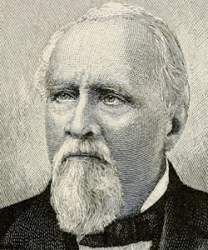Record Data
Source citation
"Georgia," The American Cyclopeadia and Register of Important Events of the Year 1865 ... (New York: D. Appleton and Co., 1869), 399-400.
Type
Newspaper
Date Certainty
Exact
Transcription
The following text is presented here in complete form, as it originally appeared in print. Spelling and typographical errors have been preserved as in the original.
"In the recent remodelling of their Constitution, the people of Georgia have acknowledged the Constitution, laws, and treaties of the United States as the Supreme Law. This means something more than yielding of the contest, or an overture for restoration. It implies fidelity to the supreme law in all future legislative, executive, and judicial action, and in all future movement of the people en masse. It implies a recognition of duty to and interest in the whole country, as well as to and in the State of Georgia. It is of course predicated upon a reciprocal obligation on the part of those to whom this pledge is renewed.
The institution of slavery—the principal source of discord in the past—has been effectually eradicated from our social and political systems. It can never again disturb the harmony of our national deliberations, without which the Federal Union must be a curse instead of a blessing. If the whole people, repressing all promptings of sectional feelings and interest, will faithfully observe and obey the Federal Constitution, coming events may lift the veil which now covers recent demonstrations of Providence, and disclose to their rectified vision, in striking contrast, ruin caused by human folly and renovation wrought by divine wisdom.
Let not our people yield to discouragement, in view of the tardy progress of reconstruction, or of the suspicion and distrust so palpably manifested toward them. Sustained by conscious rectitude, let them maintain with calm and resolute dignity the position they have taken, and await the result. A tempest of unsurpassed fury has swept over the land. The elements do not subside into their normal quiet instantaneously with the lull of the wind, the sleep of the lightning, and the hush of the thunder. The smoke of an hundred battles does not vanish in a moment. But the atmosphere will clear ere long; those who cannot now see how men who recently fought with such desperation against the United states, can so soon become its real citizens, will then look at us through a rectified medium. It will occur to them that valor and truth are twin sisters, born of magnanimity, whose womb never did nor never will conceive treachery. They will then remember and appreciate the historical fact, that the State now returning never confederated against the United States, until each for herself had in open day, and in the hearing of all mankind, declared herself separate from that power. And although they will still hold that act wrong in principle and void in fact, they will find in it no taint of duplicity. They will look in vain through all the sanguinary traces of war for the trail of the serpent. In due time consistency will command confidence, and sincerity, like the diamond of the first water, will assuredly win its own recognition. Then our too suspicious judges will marvel less at our approved fealty, than at their own tardiness in discerning it.
Be the process of reconstruction long or short, when consummated, our attitude will and must be that of strict fidelity to the Union, of equality with our associates, and of dignity sustained by our inner sense of unviolated integrity."
Respecting the freedmen, he said:
"It is undoubtedly true that during all the years of his enslavement he has been marvellously kind, profoundly content with his condition; and what shail be said of his deportment during the last half decade of sad memories? Whilst you strong men were in the tented field, far away from unprotected wives and children, lhe cultivated their lands, tended their households, and rendered all servile observances as when surrounded by tho usual controlling agencies. And since the fiat of emancipation, which he neither forced nor implored, although sometimes unsettled in his purpose, and inconstant in his service by contract (the natural results of a transition so sudden and so thorough), I take you all to witness that in the main his conduct has been praiseworthy beyond all rational expectation. Tell me not of instances of insubordination as a slave, and of indecorum as a freedman, that have transpired in certain localities or characterized particular individuals. These are exceptional cases, the general rule being quite otherwise. Do our own race render unvarying obedience to the mandates of law? Are our own offspring through the years of minority always subordinate to parental authority? Shall, then, the less cultivated African be held to a stricter accountability or be judged by a higher standard of moral rectitude? Tell me not the race is ungrateful. The assertion is against the truth of tradition and experience. I here declare that, in my judgment, their fidelity in the East, and their decorum under the distressing influences of the present, are without a parallel in history, and establish for them a claim upon our favoring patronage. As the governing class, individually and collectively, we owe them unbounded kindness, thorough protection, incentives by moral suasion, by appeals to their interest, and by just legal restraint to do right, that they may do well. Their rights of person and property should be made perfectly secure. So secure that they may realize their freedom and its benefits, and of it they should be encouraged and stimulated to make benefit. To this end the courts must be opened to them, and they must be allowed in the assertion and defence therein of the rights in civil and criminal cases, the testimony of their own race. As essential to their well-being, they should be guarded on the one hand against the crafty machinations of the designing, and on the other against the fatal delusion of social and political equality."

